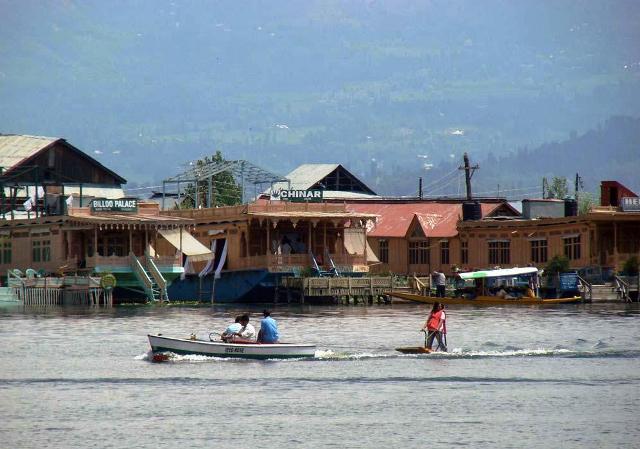 image
image
India's record far better in Kashmir Valley than China's Xinjiang: Canada think tank report
Toronto, Jan 5 (IBNS-Just Earth News) India has given the Muslim-majority Kashmir Valley population far greater political autonomy and cultural freedom than China has done in Xinjiang, which too is a Muslim-dominated province roiled by demand for separation from China, according to the International Forum for Rights and Security (IFRAS), a Canada-based think tank body.
The research paper titled 'Jammu & Kashmir and Xinjiang Uyghur Autonomous Region - A Study in Contrasts' was released last month by IFRAS.
The paper, while drawing parallels between the provinces of Jammu & Kashmir (J&K) and Xinjiang Uyghur Autonomous Region (XUAR), highlights how the Indian and Chinese governments have adopted distinctly different approaches and methods to deal with comparable challenges in the two regions.
Enumerating similarities, namely a Muslim-majority local population, extremism, cross-border terrorism emanating from Pakistan and the disputed border, the paper concludes that as compared to XUAR, J&K today enjoys far greater political autonomy.
Despite special political status granted to the two regions, the study highlights that while China's Regional Ethnic Autonomy Law has proven largely ineffective in ensuring true self-governance by ethnic groups like the Uyghurs, the people of J&K have been provided guarantees under Article 370 of the Indian Constitution, and a strong foundation to build a system of local governance.
.jpg) The study also observes that though the issues confronting the Indian government vis-à-vis cross-border terrorism, separatism and the dispute with Pakistan over Kashmir, are more complex as compared to the problems faced by China in XUAR, the response of the Chinese government and its security forces against the Uyghurs has been far more overwhelming and disproportional.
The study also observes that though the issues confronting the Indian government vis-à-vis cross-border terrorism, separatism and the dispute with Pakistan over Kashmir, are more complex as compared to the problems faced by China in XUAR, the response of the Chinese government and its security forces against the Uyghurs has been far more overwhelming and disproportional.
The paper concludes that India has not imposed the kind of stringent controls on Muslims of the Kashmir Valley as China has done in Xinjiang, noting instead that India has gone to great lengths to protect the Kashmiri tradition, culture, and religion, unlike China that has, over the years, carried out a systematic policy of mass migration of Han Chinese to XUAR, besides cracking down on the observance of Uyghur religion, customs, practices, language and culture in Xinjiang.
Started in 2011, The International Forum For Rights And Security (IFFRAS) is a non-profit international think-tank with headquarters in Toronto, Canada and offices in Brussels, Geneva, Ottawa and Washington.
.jpg) IFFRAS is currently chaired by legal scholar and Canadian Member of Parliament (MP) Mario Silva.
IFFRAS is currently chaired by legal scholar and Canadian Member of Parliament (MP) Mario Silva.
Mr Silva has an expertise in international law with his doctoral thesis based on the riveting topic of ‘failed states’. He is active in the arena of human rights and has been working towards combating social ills like anti-semitism and is also a staunch advocate of holocaust education.
Image Sources: PIB, Wikipedia Creative Commons and Kashmir Wallpapers
Top Headlines
-
News
Ali Khamenei (19392026): Irans Supreme Leader who ruled with an iron grip
March 01, 2026
-
News
Ali Khamenei (19392026): Irans Supreme Leader who ruled with an iron grip
March 01, 2026
-
News
Ayatollah Ali Khamenei killed in US-Israeli Air Strikes; Irans Revolutionary Guards vow sweeping retaliation
March 01, 2026
-
News
PM Modi expresses displeasure over NCERT judiciary chapter, wants accountability fixed
February 26, 2026
-
News
Former New Zealand PM Jacinda Ardern to relocate to Australia amid growing Kiwi exodus
February 26, 2026
-
News
Major aviation boost for Kashmir: Cabinet clears development of a new Civil Enclave at Srinagar International Airport
February 24, 2026
-
News
India urges all nationals to leave Iran 'by available means' as US-Iran tension grows
February 23, 2026
-
News
Ind.AI: Sovereignty, jobs, energy and the What If?
February 20, 2026
-
News
From car diplomacy to global strategy: Modi, Macron upgrade IndiaFrance ties
February 17, 2026
-
News
Seva Teerth: PM Modi inaugurates new PMO, announces these key decisions on first day
February 13, 2026





